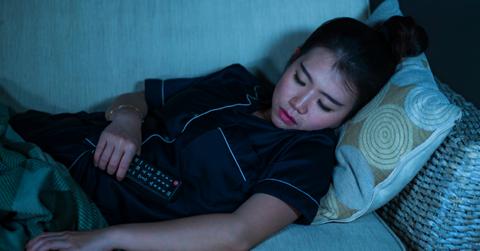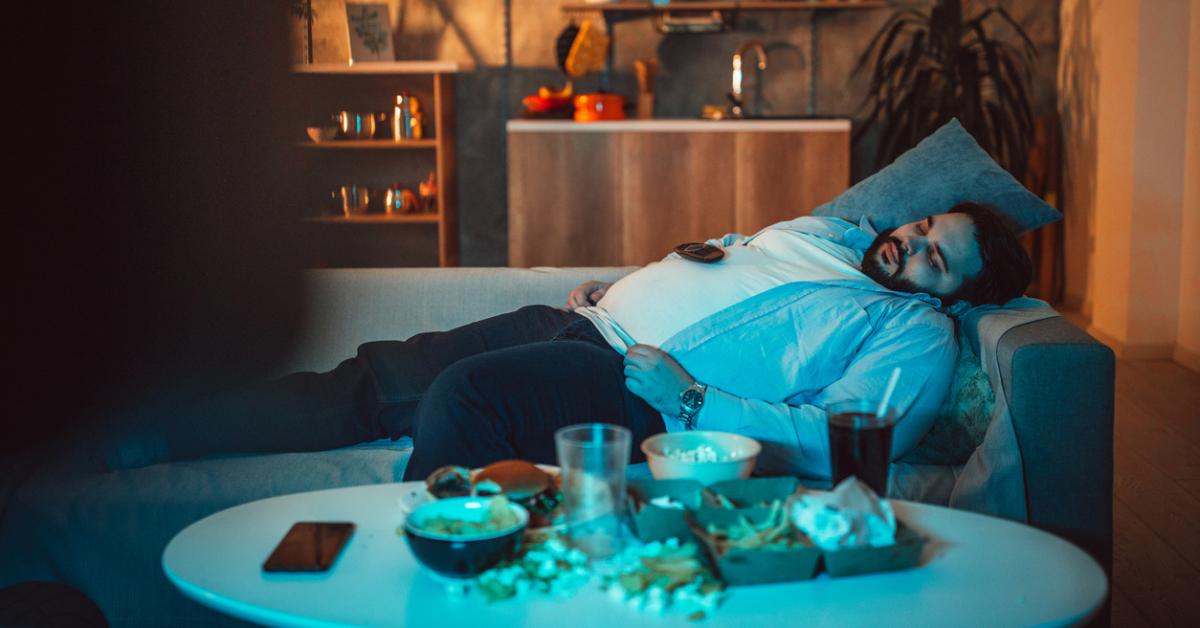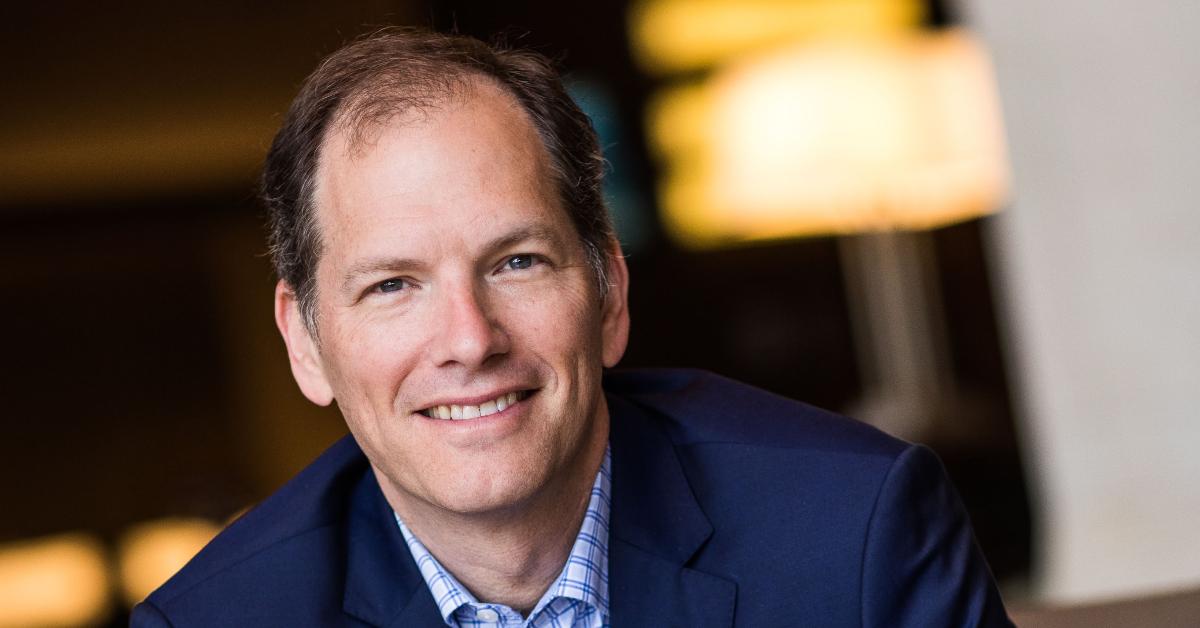Is it Bad to Fall Asleep With the TV On? One Sleep Expert Says Not Quite: "Not All Screens Are Created Equal" (Exclusive)
Published Oct. 27 2023, 10:11 a.m. ET

We've all fallen asleep to Friends or Seinfeld reruns. Perhaps you've watched back-to-back episodes of The Nanny on Nick at Nite, your eyelids getting heavier with every "Oh Mistah Sheffield." Or maybe your poison is gruesome Dateline marathons on the Oxygen channel. Odds are you've fallen asleep with the TV blasting, blue light shining over your bedsheets and freshly moisturized skin.
Most sleep experts would say this is "bad." But why? We asked Dr. Michael J. Breus, Ph.D. — a double board-certified clinical psychologist, clinical sleep specialist, and best-selling author — about his thoughts on the ongoing screens in bed debate. As founder of sleep wellness company The Sleep Doctor and "one of only 168 psychologists to pass the Sleep Medical Specialty Board without going to medical school," the doc knows his stuff when it comes to catching Zzzs.
In an exclusive e-interview with Green Matters, Dr. Breus touched on the consequences of blue light exposure, active versus passive screen time, and his controversial opinions on sleeping with the TV on. Keep those peepers open, you'll want to stay awake for this.
That said, bear in mind that Dr. Breus is not a medical doctor, and this article is not meant to be construed as medical advice. Be sure to consult with your physician before making any significant lifestyle changes.

Is TV in bed bad for sleep quality? Dr. Michael J. Breus says it's complicated.
Dr. Breus tells Green Matters that "people tend to sleep best in a cool, dark, and quiet environment." Naturally, having the television on disrupts two of those three elements. However, a 2022 Sleep Foundation survey found that watching TV is the most popular bedtime ritual for adults in America, as 52.7 percent of people channel surf before sleeping.
The ongoing conversation surrounding screens in bed is much more nuanced when you consider the type of technology, the level of engagement, and the time spent with screens before and after actually falling asleep.
"Falling asleep is what most people actually use TV to help them do. [This is] often due to anxiety from the day called 'monkey mind,' so TV serves as a great distraction," he says.
According to a Psychology Today article by Dr. Diana Raab, Ph.D., "monkey mind" is a Buddhist principle that "refers to being unsettled, restless, or confused." It can also be seen as the "inner critic," as put by Buddhist writer Natalie Goldberg. Stress and our "inner critic" mess with our ability to fall asleep.
"When you’re stressed, your body releases cortisol, the main stress hormone. This coincides with sugar, or glucose, entering the bloodstream, which elevates your blood pressure. Soon, your muscles are tensing up, your heart is pumping, and your brain is working overtime. This reaction is best known as the “fight or flight” response," he explains. "That response is what makes it hard to fall asleep."
We look to escapism when we wish to rid our minds of daily stress and anxiety, and TV is perfect for that. It's harder to sulk over your rocky career development while watching Rick and Morty travel to Dimension C-131.
Though the Cleveland Clinic relayed that "there's no hard and fast rule as to when you should put down your phone before bed," generally, screens should be put away an hour or two before bed. Part of the problem with traditional television is that it doesn't turn off. Thankfully, technology has come a long way.
"In theory, once you are asleep, if the TV could magically turn off, you would be just fine. Technology has changed quite a bit and this is very possible with a sleep timer," he continues. If you must fall asleep with the TV on, Dr. Breus has previously suggested setting the sleep timer to 90 minutes.
So, if a bit of distraction can actually help us fall asleep, why are most sleep specialists so against screens in bed? It's all about that nasty blue light exposure.
Here's what you need to know about blue light exposure.
"Blue light exposure from the screen prior to sleep in theory reduces melatonin production, which would have an effect on falling asleep. However, this is often only true depending upon how much blue light the people were exposed to during the day. So there must be other intervening factors," Dr. Breus says.
Per the Cleveland Clinic and sleep medicine expert Dr. Michelle Drerup, PsyD, DBSM, "melatonin is a hormone responsible for controlling your sleep-wake cycle." Considering blue light is an "artificial color that mimics daylight," studies have shown it can disrupt our circadian rhythm — aka our natural sensitivity and associations with light and dark.
"Information about the light in an environment and the time of day travels from the retina to various areas of the brain, including the pineal gland. When the environment gets dark, the retinas sense less light and the pineal gland produces melatonin. In the morning, when the environment grows brighter, the retina signals the pineal gland to produce less melatonin," Dr. Breus explains.

Dr. Michael J. Breus, Ph.D.
According to UC Davis Health and optometrist Dr. Melissa Barnett, constant blue light exposure could potentially damage retinal cells, cause age-related macular degeneration, and contribute to cataracts and eye cancer. To combat sleep and vision problems associated with blue light, people can apply blue-light filters to personal screens and follow the 20-20-20 rule: "Take a 20-second break to view something 20 feet away every 20 minutes."
Regarding sleep, Dr. Drerup believes "the content you’re looking at probably has more of an impact than the blue light from the screens.” Doomscrolling, for example, will keep you energized and possibly stressed more so than playing a gentle ASMR video. Dr. Breus tends to agree.
"It's all about the engagement, which is why I don't like iPads and phones," he tells us. "Watching TV [is] a very passive activity (content is basically flowing over you). But, if you are trying to get your high score on Candy Crush, you are doing the opposite of trying to fall asleep; you are causing your brain to get excited."
Similar to doomscrolling prior to sleep, Dr. Breus isn't a fan of responding to Facebook posts that elicit an emotional response (good or bad), as "this will affect sleep onset."
Light exposure and level of engagement are just two factors related to screens in bed.
"I would argue [that] both phones and iPads have proximity issues (they are close to your eyes), whereas a TV is across the room," he says.
Overall, Dr. Breus is "tired of all the old dogma that goes with sleep ideas," as much of it is outdated. "Technology has helped us past many of these obstacles."
Dr. Michael J. Breus has simple tips for getting great sleep.
There are six "ingredients" in Dr. Breus's "recipe" for fabulous sleep. (Remember that Dr. Breus is not an M.D., so make sure to check with your doctor before making any major changes to your routine.)
- Stick to a "consistent wake up time based on your chronotype." (Take the official Sleep Doctor chonotype quiz here!)
- Control that coffee addiction! "Stop caffeine by 2:00 p.m. (eventually work your way to stop by 10:00 a.m.)."
- "Stop alcohol three hours before bed and limit yourself to two drinks."
- Exercise daily, but not within four hours of your bedtime.
- Upon waking up, "take 15 deep breaths, drink 15 ounces of water, and get 15 minutes of sunlight."
- "Evaluate your mattress and pillow; it's probably time for a new one."
Check out Dr. Michael J. Breus's personal pre-sleep rituals:
The Sleep Doctor starts winding down at around 8:00 p.m.
"I usually change into sweats or scrubs and relax and watch some sports or news," he begins. "By 10:30 to 11:00 p.m., [I wander] into bed. My wife has the TV on. As I don't have many issues with sleep, the big thing I like to do is move our dogs off the bed or to the side, and get into a comfortable position."
When the TV timer goes off, Dr. Breus does one of three things.
There are the the 4-7-8 and box breathwork techniques, both of which have roots in the Indian yogic practice of pranayama, per the Cleveland Clinic. Or, he'll create a mental gratitude list. We should all be ending our days with positive thoughts!
"I'm usually asleep within 15 minutes," he concludes.